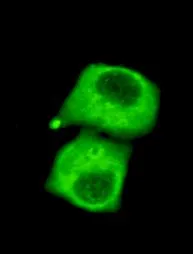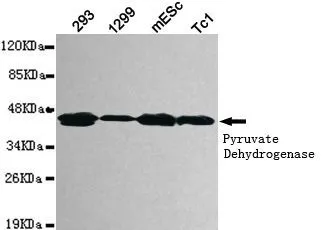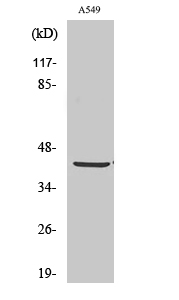
ICC/IF analysis of HeLa cells using Pyruvate Dehydrogenase antibody at a dilution of 1:150.
Pyruvate Dehydrogenase antibody [3H2-F8-B5]
GTX49178
ApplicationsImmunoFluorescence, Western Blot, ImmunoCytoChemistry
Product group Antibodies
ReactivityHuman, Mouse
TargetPDHA1
Overview
- SupplierGeneTex
- Product NamePyruvate Dehydrogenase antibody [3H2-F8-B5]
- Delivery Days Customer9
- ApplicationsImmunoFluorescence, Western Blot, ImmunoCytoChemistry
- CertificationResearch Use Only
- ClonalityMonoclonal
- Clone ID3H2-F8-B5
- ConjugateUnconjugated
- Gene ID5160
- Target namePDHA1
- Target descriptionpyruvate dehydrogenase E1 subunit alpha 1
- Target synonymsE1alpha, PDHA, PDHAD, PDHCE1A, PHE1A, pyruvate dehydrogenase E1 component subunit alpha, somatic form, mitochondrial, PDHE1-A type I, pyruvate dehydrogenase (lipoamide) alpha 1, pyruvate dehydrogenase E1 alpha 1 subunit, pyruvate dehydrogenase alpha 1, pyruvate dehydrogenase complex, E1-alpha polypeptide 1
- HostMouse
- IsotypeIgG1
- Scientific DescriptionThe pyruvate dehydrogenase (PDH) complex is a nuclear-encoded mitochondrial multienzyme complex that catalyzes the overall conversion of pyruvate to acetyl-CoA and CO(2), and provides the primary link between glycolysis and the tricarboxylic acid (TCA) cycle. The PDH complex is composed of multiple copies of three enzymatic components: pyruvate dehydrogenase (E1), dihydrolipoamide acetyltransferase (E2) and lipoamide dehydrogenase (E3). The E1 enzyme is a heterotetramer of two alpha and two beta subunits. This gene encodes the E1 alpha 1 subunit containing the E1 active site, and plays a key role in the function of the PDH complex. Mutations in this gene are associated with pyruvate dehydrogenase E1-alpha deficiency and X-linked Leigh syndrome. Alternatively spliced transcript variants encoding different isoforms have been found for this gene.
- ReactivityHuman, Mouse
- Storage Instruction-20°C or -80°C,2°C to 8°C
- UNSPSC12352203






